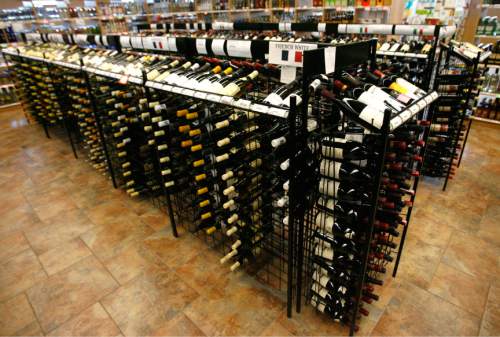This is an archived article that was published on sltrib.com in 2015, and information in the article may be outdated. It is provided only for personal research purposes and may not be reprinted.
The Utah Department of Alcoholic Beverage Control plans to change the way security is provided at the 43 state-owned liquor stores in hopes of saving money, officials said Wednesday.
Beginning July 1, the DABC plans to hire a single provider for all store security needs rather than contract with individual police officers from the cities where the stores are located. The individual security contracts have allowed off-duty officers a chance to make extra pay.
"We appreciate the service that has been provided by existing security staff, and we consider it unfortunate that we have to move in another direction for security services," DABC spokeswoman Vickie Ashby said in a written statement.
On Tuesday, the agency sent a formal notice to security coordinators around the state announcing the "termination of the security contracts for all individuals."
"Unfortunately, due to budget cuts for the upcoming fiscal year, we will be unable to use independent security contractors," said the letter sent by DABC Deputy Director Tom Zdunich.
During the 2015 legislative session, lawmakers cut the DABC budget by about $500,000, and now, officials are trying to find ways to save money before the next fiscal year begins July 1. Despite the cuts, DABC leaders have said they do not want to close stores or cut operating hours.
DABC officials will have to go through a bid process to select a security provider. The department is not sure how much the switch will save, but officials believe a single contract is more affordable than the current practice. In the current fiscal year, the DABC is expected to spend $460,000 for security, Ashby said.
Utah liquor stores have varying degrees of security, Ashby said. Some stores have it all the time, others only when it is warranted, usually during peak hours and holidays.
Having security is a safety issue for the public and employees, said Detective Cody Lougy with the Salt Lake City Police Department
"The officers provide a deterrent for all kind of activities, from DUIs to public intoxication," he said.
The liquor-department budget cuts come at a time when the department is making record profits for the state.
During the 2013-2014 fiscal year, state liquor sales were $367.2 million, a jump of nearly 6 percent from the previous 12 months. Sales figures for the first nine months of the current fiscal year — July 2014 through March 2015 — have shot up nearly $21 million or about 7.56 percent, DABC reports show.
State law requires the DABC to return all its profits to the state, and the Legislature sets the department budget. Most of the liquor funds go into the general operating fund, and sales-tax revenues go toward the school-lunch and public-safety programs.



